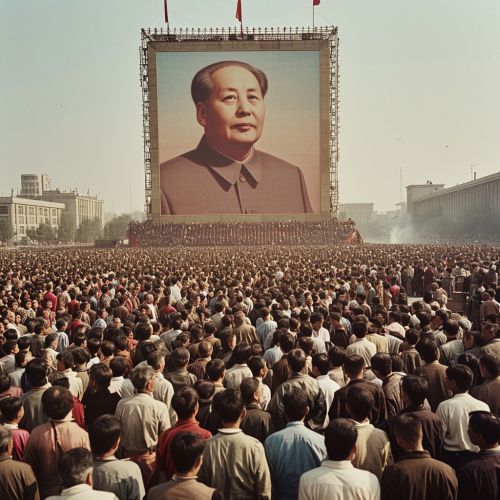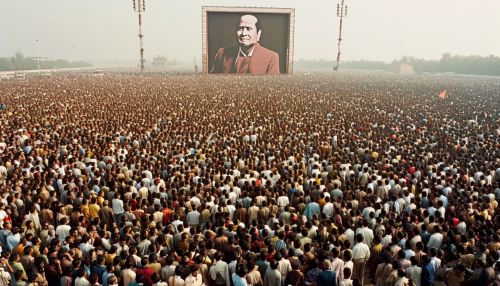Cult of personality
Overview
A Cult of personality or personality cult arises when a country's regime – or, more rarely, an individual – uses the techniques of mass media, propaganda, the big lie, spectacle, the arts, patriotism, and government-organized demonstrations and rallies to create an idealized, heroic, and, at times, worshipful image of a leader, often through unquestioning flattery and praise. A cult of personality is similar to apotheosis, except that it is established by modern social engineering techniques, usually by the state or the party in one-party states and dominant-party states. It is often seen in totalitarian or authoritarian countries.
History and Origins
The cult of personality phenomenon stems from the ancient world, where emperors and rulers were often deified. However, it has reached its zenith in the 20th century with the advent of mass media and technology, which have been used to propagate the leader's image and messages in an unprecedented manner. The term "cult of personality" probably appeared in English around 1800–1850, along with the French and German use.
Characteristics
A cult of personality involves a country's leader using mass media to create an idealized and heroic public image, often through unquestioning flattery and praise. Cults of personality are often found in dictatorships but can be found in some democracies as well. A cult of personality is constructed around a leader who is perceived to have charismatic or transformational qualities. The leader is portrayed as a messiah and thus entitled to unquestioned loyalty and obedience.
Criticisms and Controversies
Cults of personality are frequently associated with dictatorships and totalitarian states. Such cults are often marked by the promotion of a leader's image, whether in official communications or everyday life. This can be seen in the use of mass media to broadcast the leader's speeches, the display of the leader's portraits in public places, and the incorporation of the leader's name into everyday conversation and institutional nomenclature. Critics argue that this is often done at the expense of the traditional social fabric and cultural norms, leading to a society where individual critical thinking and dissent are stifled.
Examples
Throughout history, there have been numerous examples of cults of personality. Some of the most notable include those associated with Joseph Stalin in the Soviet Union, Mao Zedong in China, Kim Il-sung in North Korea, and Adolf Hitler in Nazi Germany. In these cases, the leaders used propaganda and control over the media to create an idealized and heroic image, often centered around a nationalist ideology and promoting the leader's role as a savior of the 'people'.
Impact and Influence
The impact of a cult of personality on a society can be profound and long-lasting. It can shape the political landscape, influence the culture, and even affect the economy. The leader's image becomes omnipresent and infused into every aspect of life, from education and the arts to the economy and the law. This can lead to a society where dissent is stifled and the leader's power is unchecked. Furthermore, the leader's policies and decisions, no matter how detrimental, are often seen as infallible, leading to a lack of accountability and transparency.
In Popular Culture
The concept of a cult of personality has also been explored in literature, film, and other forms of popular culture. George Orwell's novel 1984 presents a dystopian society where a totalitarian regime uses propaganda and surveillance to maintain a cult of personality around the leader, Big Brother. In film, the 2006 German drama The Lives of Others explores the impact of a personality cult on the lives of ordinary citizens in East Germany during the Cold War.


